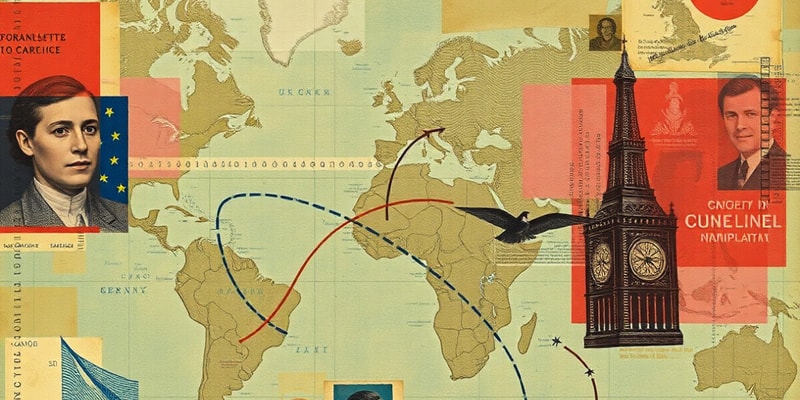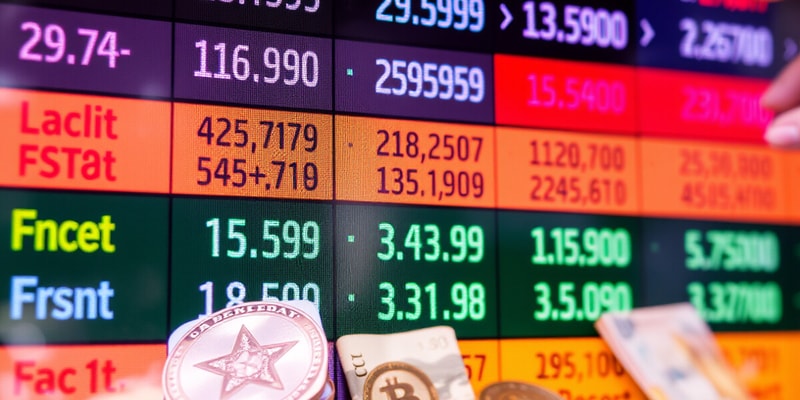Podcast
Questions and Answers
What is a floating exchange rate?
What is a floating exchange rate?
A floating exchange rate is a currency value that is determined by the market forces of supply and demand relative to other currencies.
What happens to the Australian dollar when there is a decline in its price?
What happens to the Australian dollar when there is a decline in its price?
A fall in the price of the Australian dollar generally leads to a depreciation, making exports cheaper and imports more expensive.
How would an increase in US interest rates affect the demand for Australian dollars?
How would an increase in US interest rates affect the demand for Australian dollars?
An increase in US interest rates relative to Australian interest rates would likely lead to a decrease in demand for Australian dollars as investors may prefer to invest in the US for higher returns.
What impact would a large influx of inbound tourism, such as during the World Cup, have on the supply of Australian dollars?
What impact would a large influx of inbound tourism, such as during the World Cup, have on the supply of Australian dollars?
Signup and view all the answers
What is one major disadvantage of a floating exchange rate system?
What is one major disadvantage of a floating exchange rate system?
Signup and view all the answers
How does a floating exchange rate ensure equilibrium in the balance of payments?
How does a floating exchange rate ensure equilibrium in the balance of payments?
Signup and view all the answers
What role do foreign reserves play in a floating exchange rate system?
What role do foreign reserves play in a floating exchange rate system?
Signup and view all the answers
What is the main consequence of a government maintaining an artificially high fixed exchange rate?
What is the main consequence of a government maintaining an artificially high fixed exchange rate?
Signup and view all the answers
Describe how an undervalued currency can stimulate economic growth.
Describe how an undervalued currency can stimulate economic growth.
Signup and view all the answers
Identify a significant factor that allows a fixed exchange rate system to be maintained.
Identify a significant factor that allows a fixed exchange rate system to be maintained.
Signup and view all the answers
Discuss one major disadvantage of a fixed exchange rate system.
Discuss one major disadvantage of a fixed exchange rate system.
Signup and view all the answers
What are the allowed fluctuations in a fixed exchange rate system under IMF conditions?
What are the allowed fluctuations in a fixed exchange rate system under IMF conditions?
Signup and view all the answers
How did the US government's decision in August 1971 affect the fixed exchange rate system?
How did the US government's decision in August 1971 affect the fixed exchange rate system?
Signup and view all the answers
What role does speculation play in a fixed exchange rate system?
What role does speculation play in a fixed exchange rate system?
Signup and view all the answers
State one advantage of a fixed exchange rate system for international trade.
State one advantage of a fixed exchange rate system for international trade.
Signup and view all the answers
Why might a government decide to fix its currency at a level above the market equilibrium?
Why might a government decide to fix its currency at a level above the market equilibrium?
Signup and view all the answers
What determines the value of a currency in a floating exchange rate system?
What determines the value of a currency in a floating exchange rate system?
Signup and view all the answers
How does high demand for a country's exports influence its currency value?
How does high demand for a country's exports influence its currency value?
Signup and view all the answers
What is a managed or 'dirty' float in the context of exchange rates?
What is a managed or 'dirty' float in the context of exchange rates?
Signup and view all the answers
What actions can a government take if it believes its currency value is too low?
What actions can a government take if it believes its currency value is too low?
Signup and view all the answers
List one advantage of a floating exchange rate system.
List one advantage of a floating exchange rate system.
Signup and view all the answers
What is a potential disadvantage of floating exchange rates for a country's economy?
What is a potential disadvantage of floating exchange rates for a country's economy?
Signup and view all the answers
In what way can a falling exchange rate affect domestic inflation?
In what way can a falling exchange rate affect domestic inflation?
Signup and view all the answers
How can a declining value of a currency impact investor confidence?
How can a declining value of a currency impact investor confidence?
Signup and view all the answers
What happens to the price of a currency when demand decreases?
What happens to the price of a currency when demand decreases?
Signup and view all the answers
Study Notes
Exchange Rates
- Exchange rates express the value of one currency in terms of another
- International trade involves the exchange of commodities between individuals and firms, not nations directly
- Payment procedures for international trade are complex due to:
- Distance between buyer and seller
- Different currencies involved
- Variations in purchasing power
- Transport, handling, and storage costs
- Government regulations and additional charges
- International payments are often settled using a third country's currency
- The process may involve electronic transfers instead of physical currency exchanges
Exchange Rate Definitions
- Currency appreciation: An increase in the value of a currency relative to another
- Currency depreciation: A decrease in the value of a currency relative to another
- Currency devaluation: Deliberate downward adjustment to the value of a currency.
- Currency revaluation: Deliberate upward adjustment to the value of a currency.
- Exchange rate: The value of a nation's currency expressed in terms of another nation's currency.
- Foreign exchange (forex) market: The market where international currencies are traded
- Export price index: A statistical measurement used to monitor fluctuations in export prices.
- Import price index: A statistical measurement used to monitor fluctuations in import prices.
- Terms of trade: The relationship between the prices of exports and imports.
- Terms of trade index: A statistical measurement used to monitor price fluctuations
- Gold Exchange Standard: A system used to determine currency value based on gold.
Types of Exchange Rates
- Fixed exchange rate: The government fixes a currency's value to that of another
- Floating exchange rate: Market forces determine a currency's value
Government Intervention
- Governments intervene in the foreign exchange market to influence or control exchange rates
- They can buy or sell a nation's currency to manage exchange rates
- This can involve either a managed or "dirty" float
Factors Affecting Exchange Rates
- Relative inflation rates: If a country's inflation rate is higher than that of its trading partners, its currency is likely to depreciate.
- Relative interest rates: Higher interest rates tend to attract foreign investment, increasing demand for the currency and causing appreciation.
- Trade balances: A country with high demand for exports will likely see its currency appreciate.
- Government policies: Government decisions like altering interest rates or imposing tariffs can influence demand and supply of the currency.
- Investor confidence: Investor confidence plays a major role in currency movements. Positive expectations about a country's economy might boost the value of its currency.
- International events: Events like war, political instability, or natural disasters can significantly impact exchange rates.
- Commodity prices: Price fluctuations of raw materials can directly affect exchange rates, especially for countries reliant on resource exports.
- Speculation: Speculators in the forex market buy and sell currencies based on anticipated movements, influencing demand and supply forces.
Terms of Trade
- The terms of trade measure the relative price of a country's exports compared to its imports.
- A favorable terms of trade means export prices rise more than import prices, increasing a country's purchasing power.
- Unfavorable terms of trade occur when import prices increase faster than export prices.
Studying That Suits You
Use AI to generate personalized quizzes and flashcards to suit your learning preferences.
Related Documents
Description
This quiz covers the fundamental concepts of exchange rates and their role in international trade. Explore definitions like currency appreciation, depreciation, devaluation, and revaluation, and understand the complexities of payment procedures in a global market.




